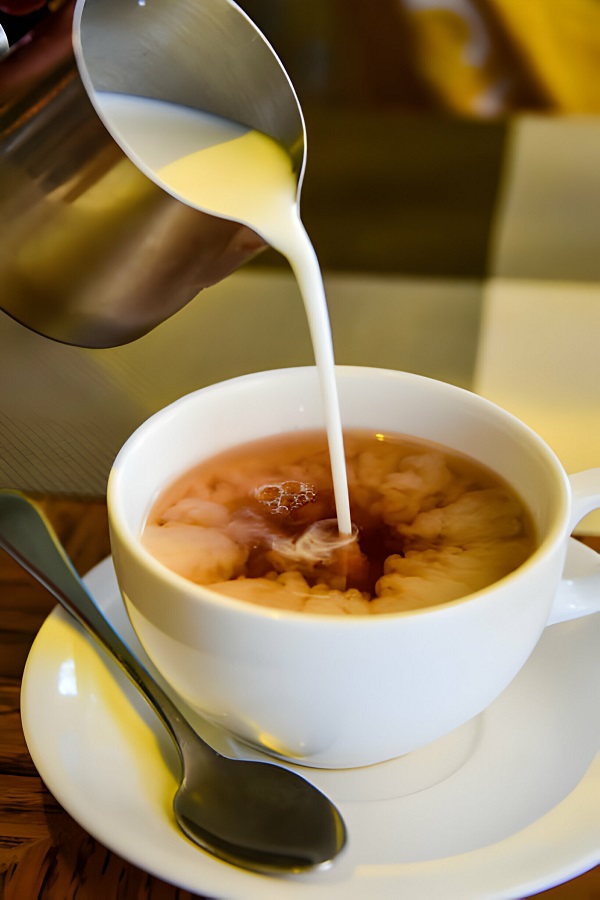Last Updated on January 1, 2025
Mother’s Milk Tea is used to support lactation in breastfeeding mothers. It is typically consumed to increase milk production naturally and is made from a blend of herbs known for their lactation-enhancing properties.
Mother’s Milk Tea is a herbal remedy that has been used for centuries to help mothers produce more breast milk. The tea is usually composed of fenugreek, fennel, and other herbs that are believed to promote lactation. It is commonly recommended for women who struggle with low milk supply or want to enhance their breastfeeding journey.
Many mothers find that adding Mother’s Milk Tea to their daily routine can help to boost milk production and provide the nourishment their babies need. However, it’s important to consult with a healthcare professional before using the tea to ensure it is safe and suitable for individual needs.
Health Benefits Of Mother’s Milk Tea

The health benefits of Mother’s Milk Tea are numerous, making it an excellent choice for nursing mothers. This herbal tea blend is specifically designed to support lactation, providing a natural and safe way to increase milk production.
Read More – What Are The Benefits Of Mother’s Milk Tea?
Boosting Milk Supply
Mother’s Milk Tea is formulated with ingredients that have been traditionally used to enhance milk production in breastfeeding mothers. The combination of herbs like fenugreek, fennel, and blessed thistle works together to stimulate the mammary glands, resulting in an increased milk supply.
By incorporating Mother’s Milk Tea into your daily routine, you can effectively boost your milk production and ensure your baby is getting all the nourishment they need.
Relieving Digestive Issues
Mother’s Milk Tea can also provide relief for common digestive issues that both mothers and babies may experience during breastfeeding. The soothing properties of herbs like chamomile and anise help alleviate symptoms such as gas, colic, and indigestion.
By drinking a warm cup of Mother’s Milk Tea, you can support your baby’s digestive health and ease any discomfort they may be experiencing.
| Benefits of Mother’s Milk Tea |
|---|
| Boosts milk supply |
| Relieves digestive issues |
| Natural and safe for breastfeeding |
| Easy to incorporate into daily routine |
| Supports overall lactation |
Mother’s Milk Tea offers a range of health benefits for breastfeeding mothers. From increasing milk supply to relieving digestive issues, this herbal tea blend is a natural and safe way to support lactation. By incorporating it into your daily routine, you can ensure a healthy and thriving breastfeeding experience for both you and your baby.
Read More – Can You Travel With Breast Milk Without Baby?
When To Use Mother’s Milk Tea
Low Milk Supply
If you are experiencing a low milk supply, Mother’s Milk Tea may help stimulate milk production and increase your milk supply. The natural ingredients in the tea, such as fenugreek, fennel, and blessed thistle, have been traditionally used to support lactation.
Engorgement
For mothers struggling with engorgement, Mother’s Milk Tea can provide relief. The combination of herbs in the tea can help promote healthy lactation and alleviate the discomfort caused by engorgement. The tea’s soothing properties can provide comfort during this challenging time.
Blocked Milk Ducts
If you’re experiencing blocked milk ducts, drinking Mother’s Milk Tea may help to clear the blockage. The warm liquid and herbal blend can aid in loosening the blockage and promoting better milk flow, providing much-needed relief from the discomfort of blocked ducts.
Using Mother’s Milk Tea Safely
Using Mother’s Milk Tea safely is essential for breastfeeding mothers to ensure the well-being of both themselves and their babies. It’s crucial to be mindful of when and how to use this herbal tea to maximize its benefits while avoiding any potential risks.
Consulting With A Healthcare Provider
Before incorporating Mother’s Milk Tea into your breastfeeding routine, consult with a healthcare provider to determine its suitability for your health circumstances. Seeking professional guidance is crucial for identifying any potential contraindications or interactions with existing medications.
Following Recommended Dosage
When using Mother’s Milk Tea, it’s vital to adhere to the recommended dosage as indicated on the package or as advised by your healthcare provider. Exceeding the recommended amount can lead to unwanted side effects and may not necessarily result in increased milk production.
Alternative Methods To Increase Milk Supply
When it comes to breastfeeding, many new moms may encounter challenges with low milk supply. While there are various methods to tackle this problem, Mother’s Milk Tea has gained popularity as a natural and effective solution. However, before resorting to tea, other alternative methods can help increase your milk supply.
Breastfeeding On Demand
Breastfeeding on demand is key to establishing and maintaining a healthy milk supply. By allowing your baby to nurse whenever they show hunger cues, you are stimulating your milk production. This helps in regulating the demand and supply of milk. Remember that breast milk is produced on a supply-and-demand basis, so the more your baby nurses, the more milk your body will produce.
Proper Hydration And Nutrition
Ensuring you are properly hydrated and nourished is crucial for maintaining a healthy milk supply. Drinking plenty of water throughout the day will keep you hydrated, and including foods rich in nutrients, such as fruits, vegetables, whole grains, and lean proteins, will provide your body with the necessary fuel. Remember to eat balanced meals and snacks to keep your energy levels up and support your milk production.
Skin-to-skin Contact
Engaging in skin-to-skin contact with your baby immediately after birth and during breastfeeding sessions can have a positive impact on your milk supply. This intimate contact stimulates the release of hormones that help regulate milk production, such as oxytocin. Additionally, skin-to-skin contact promotes bonding between you and your baby, creating a calming and nurturing environment that aids in breastfeeding success.
Mother’s Milk Tea is a popular choice for increasing milk supply, but it’s important to consider alternative methods as well. Breastfeeding on demand, proper hydration and nutrition, and skin-to-skin contact are all effective strategies to boost your milk production. By incorporating these methods into your routine, you can support a healthy and abundant milk supply for your little one.
Read More – How Long Breast Milk Can Be Stored Outside?
Risks And Precautions Of Using Mother’s Milk Tea

Mother’s Milk Tea is a popular herbal remedy believed to aid in lactation. However, it carries certain risks and precautions. It is important to consult with a healthcare professional before using it to ensure it is safe and suitable for you and your baby.
Mother’s Milk Tea is a popular herbal remedy used by lactating mothers to increase milk supply. While it is generally considered safe and effective, there are potential risks and precautions to be aware of before incorporating it into your breastfeeding routine. It is important to understand the possible allergic reactions and interactions with medications that can occur.
Possible Allergic Reactions
Allergic reactions to Mother’s Milk Tea are rare but can happen. Some individuals may be allergic to certain herbs present in the tea, such as fenugreek or fennel. Symptoms of an allergic reaction can include itching, hives, swelling, or difficulty breathing. If you experience any of these symptoms after consuming Mother’s Milk Tea, discontinue use immediately and seek medical attention.
Interactions With Medications
Mother’s Milk Tea contains various herbs that can interact with medications you may be taking. It is important to consult with your healthcare provider or a lactation consultant before consuming the tea, especially if you are on medication for other health conditions. Certain medications, such as blood thinners, may have their effects altered or enhanced when combined with the herbs in Mother’s Milk Tea. Your healthcare provider will be able to provide guidance on whether it is safe for you to consume the tea while taking your current medications.
While Mother’s Milk Tea can be a helpful tool for breastfeeding mothers, it is necessary to be aware of the potential risks and exercise caution. Being informed about possible allergic reactions and understanding how the tea can interact with medications will help you make an informed decision about using Mother’s Milk Tea as part of your breastfeeding journey.
References:
– American Pregnancy Association. (2021). Herbal Tea and Pregnancy. Retrieved from https://americanpregnancy.org/healthy-pregnancy/is-it-safe/herbal-tea/
– La Leche League International. (2021). Herbal Treatments for Breastfeeding. Retrieved from https://www.llli.org/breastfeeding-info/herbal-treatments-breastfeeding/
Frequently Asked Questions Of When To Use Mother’s Milk Tea?
When Should I Start Drinking Mother’s Milk Tea?
Start drinking Mother’s Milk Tea after giving birth to help boost your milk supply.
How Often Should I Drink Mother’s Milk Tea?
You can drink Mother’s Milk Tea 3 times a day to maintain a healthy milk supply.
Can I Drink Mother’s Milk Tea While Pregnant?
It’s best to avoid drinking Mother’s Milk Tea while pregnant as it may stimulate contractions.
How Long Does It Take For Mother’s Milk Tea To Work?
You may start experiencing increased milk production within 24-48 hours of drinking Mother’s Milk Tea.
Are There Any Side Effects Of Drinking Mother’s Milk Tea?
While rare, some people may experience upset stomach or allergies from the herbs in Mother’s Milk Tea.
Conclusion
Overall, Mother’s Milk Tea can be a valuable resource for breastfeeding moms seeking to increase their milk supply naturally. Its combination of herbs can help stimulate milk production, making it a safe and effective option. However, it’s important to consult with a healthcare professional before incorporating any new supplements into your routine.
With proper guidance and monitoring, Mother’s Milk Tea can be a beneficial tool to support your breastfeeding journey.

